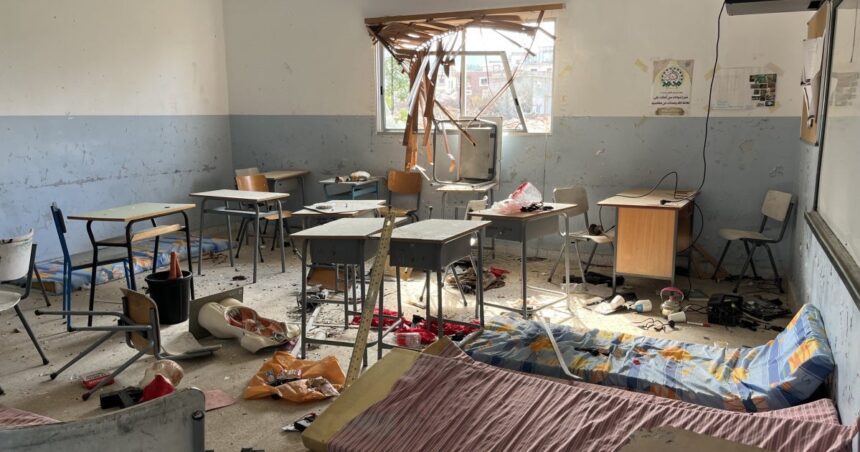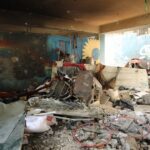24 DAILY NEWS – A Human Rights Watch report alleges potential war crimes by Israeli forces in Southern Lebanon in 2024-2025.
24 DAILY NEWS | August 7, 2025
A devastating new report by Human Rights Watch (HRW) has shed light on what may constitute war crimes committed by Israeli forces during their 2024-2025 military campaign in southern Lebanon. According to the report, Israeli ground troops occupied, vandalized, and pillaged multiple schools across the border region — many of which had served as vital educational lifelines for Lebanese children.
The findings, based on on-the-ground visits, satellite imagery, and verified visual content, allege that Israeli forces used at least five schools as military barracks, leaving behind graffiti in Hebrew and English, destroyed equipment, and even military gear scattered across classrooms.
“By pillaging schools, Israeli forces committed apparent war crimes and put the education of students in Lebanon at risk,” said Ramzi Kaiss, Lebanon researcher at HRW.
Among the most severely damaged institutions were Yarine Intermediate Public School and Naqoura Intermediate Public School, both of which were shown to have hosted Israeli troops weeks after the official ceasefire went into effect on November 27, 2024.
Devastation in Yarine
In Yarine, investigators found burned classrooms, destroyed laptops donated by USAID and France, damaged generators, and graffiti referencing Israel’s Golani Brigade, a unit previously accused of abuses in Gaza. Satellite imagery revealed that most of the village, including the school, was reduced to rubble within 10 days following Israeli troop entry.
One particularly chilling detail documented by HRW: Hebrew writing on whiteboards with messages such as “In memory of the Platoon’s fallen” and “Good Saturday people of Lebanon. Thank Nasrallah for all the destruction.”
Naqoura: Vandalism After the Ceasefire
In nearby Naqoura, where Israeli forces remained until January 7, 2025, researchers found smashed laptops, interactive boards riddled with bullet holes, and graffiti mocking Lebanese civilians. A quote on the whiteboard read: “Good Saturday people of Lebanon. Thank Nasrallah for all the destruction he brought upon you,” referring to Hezbollah’s leader.
School equipment, donated by Belgium and USAID, was found destroyed, looted, or deliberately targeted. Trees were uprooted, and bulldozer tracks through school yards revealed extensive razing of farmland around the premises.
Systematic Targeting?
The pattern of occupation and destruction was not isolated to these two schools. Other institutions in Aita al-Shaab, Tayr Harfa, and Ramieh also bore similar signs of military presence — Hebrew-labeled trash, food containers, ammunition crates, and references to Israeli military brigades.
At Tayr Harfa, graffiti showed drone schedules, soldier names, and songs written across walls. At Ramieh, HRW documented Hebrew military manuals, prepackaged food, and slogans referencing Golani Brigade once again.
In total, over 100 schools were damaged or destroyed during the hostilities, according to UNICEF, displacing thousands of students and compounding an already fragile education system crippled by Lebanon’s economic crisis since 2019.
Israel’s Response
In response to HRW’s findings, the Israeli military claimed that operating from civilian structures was sometimes a necessity and that vandalism “does not align with IDF values” and would be investigated if proven.
However, Israel has not signed the Safe Schools Declaration, a global agreement that protects educational institutions from military use. Lebanon, on the other hand, has endorsed the declaration and has urged international partners to ensure that Israeli forces are held accountable.
ICC Jurisdiction Demanded
HRW called on the Lebanese government to grant jurisdiction to the International Criminal Court (ICC), allowing it to investigate and potentially prosecute war crimes committed on Lebanese soil since October 2023. Lebanon has not ratified the Rome Statute, and thus jurisdiction currently remains limited.
“Urgent reconstruction efforts are needed so that tens of thousands of displaced residents can begin returning to their homes,” said Kaiss. “Just as importantly, Lebanon’s government should ensure justice for abuses and crimes.”
As of May 2025, more than 82,000 people remain displaced, and over 260 civilians have died after the ceasefire, according to UN High Commissioner for Human Rights reports.
Stay informed with the latest news from the US and around the world — only on
24 Daily News.




















